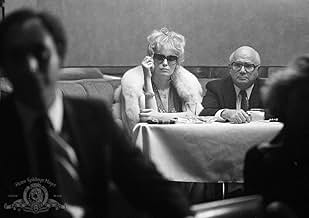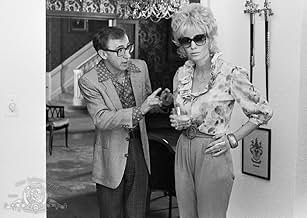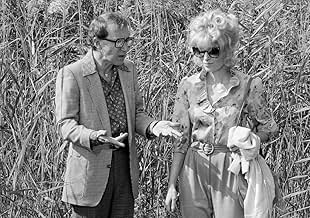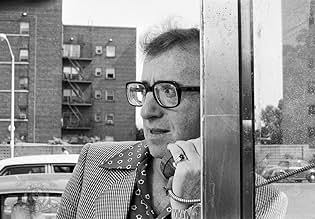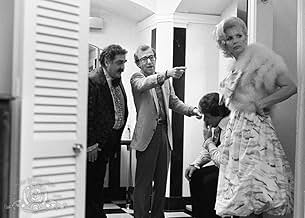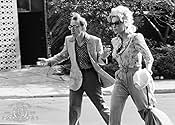Nei suoi tentativi di riconciliare un cantante di lounge con la sua amante, uno sfortunato agente di talento viene scambiato per il suo amante da un gangster geloso.Nei suoi tentativi di riconciliare un cantante di lounge con la sua amante, uno sfortunato agente di talento viene scambiato per il suo amante da un gangster geloso.Nei suoi tentativi di riconciliare un cantante di lounge con la sua amante, uno sfortunato agente di talento viene scambiato per il suo amante da un gangster geloso.
- Regia
- Sceneggiatura
- Star
- Candidato a 2 Oscar
- 3 vittorie e 5 candidature totali
- Johnny's Mother
- (as Gina DeAngelis)
Recensioni in evidenza
This is accomplished, initially, by the extremely naturalistic dialogue between the comics whose reminiscences form the bulk of the film. Notice how they all talk at once, they cut each other off, and they trample all over each other's lines. We really feel like we're listening in on a diner conversation, rather than watching a theatrical performance of a diner conversation. This gives the film an initial boost of accessibility.
This "charm factor" is cemented once we meet Danny Rose. Now, many people criticize Allen as an actor, claiming that he only ever plays one character... himself. This is absolute rubbish, and "Broadway Danny Rose" proves it. I have never seen Allen play a character so kind, warm, and accepting as Danny Rose. It was quite a pleasant surprise. Danny has to be that good, though, in order for us to accept that Tina is haunted by her betrayal of him.
That denouement, by the way, was really touching. The Thanksgiving scene took a good, funny, enjoyable movie and made it something a little more special. Compare this to the gross-out comedies of today... how many modern comedies can be as funny as "Broadway Danny Rose," and yet still create characters so real and so sympathetic that moments like the Thanksgiving scene can work?
I try not to harp on about how funny Allen's comedies are, because you either like his humor or you don't. If you like it, you don't need me to tell you it's funny, and if you don't, you won't believe me anyway. So why bother? I don't know, but I will say that this film had a good six or eight laugh out loud moments, at least, and it kept me smiling throughout.
Also, after a good debut in "A Midsummer Night's Sex Comedy" and a reduced, subdued role in "Zelig", this is the film where Mia Farrow really comes into her own as Allen's leading lady. For the first time, I don't miss Diana Keaton.
The story of the film is told by a bunch of entertainers at the Carnegie Deli in Manhattan, reminiscing about Rose (Allen), an agent for the most obscure acts in New York back in the '50s and '60s. One of them claims to have the best Danny Rose story and his telling serves as narration to the film.
The story revolves around Rose and his biggest talent, Lou Canova (Nick Apollo Forte), an old-fashioned Italian crooner doing covers of Sinatra and all kinds of classic tunes from what back then was considered a "bygone era," but Lou is having a resurgence. Problem is he's an alcoholic and a womanizer. He insists on having the woman he's having an affair with attend his big performance at the Waldorf (that could get him a national gig). Other problem is, this Tina (Mia Farrow) was told Lou was cheating on her, so now she's run off to her Italian mob family and through strange circumstances, the mob wants to knock Danny off.
There are elements of classic comedy here, which is why the black and white works for "Danny Rose." At the same time, it's a nostalgic film (the early '80s was full of that for Allen) and an intimate one.
Without spoiling too much, the key to "Danny Rose" relies in the conflict between self- interest and dependency on others. In a way, it's Allen's way of saying thank you or perhaps apologizing to those that have been part of his personal journey.
No one does it alone, especially not Danny Rose, a character whose living is dependent on the talents and aspirations of others and who lives solely by the advice he remembers from deceased relatives. Then there's Lou, who can't perform unless Tina is there but loves his wife dearly, and then Tina, who can't make any major decision without consulting a psychic elderly woman.
"Danny Rose" has some memorable Woody Allen quotes and classically comical situations such as he and Farrow's Tina "wriggling" their way out of some ropes tying them together as a former escape artist client of Danny's used to say, or when they're chased into the Macy's Day Parade balloon warehouse.
The film is simplistic but truthful and it's nice to see Allen make a point that's so universal instead of one about affluent people solving their life crises.
Allen and Farrow both give career performances. Nick Apollo Forte is absolutely wonderful. The casting, locations, directing, and performances could not be better. Every aspiring film maker should study this film as the perfect example of a powerful "little" film. Watch the film several times and you'll like it more each time. It is may favorite Woody Allen film (everything else is a distant second) and one of my favorite films of all time. The film's lack of commercial and critical success speaks volumes about the sensibilities and values of our society.
A squeaky voiced Mia Farrow disguised in a curly blonde wig and dark glasses foreshadows Mira Sorvino's performance in Mighty Aphrodite. The rest of the cast are unknown, some of the actors being real-life Jewish comedians and speciality acts. It is interesting to reflect on the interchangeability of Jewish and Italian behaviour in the film, the exaggerated emotions and the theatrical gestures. This is something that is apparent in other films such as Dirty Dancing or Moonstruck, which would have worked equally well as Jewish films or Italian films.
Allen gives one of his best performances as the hapless Danny, promoting a portfolio of one-legged tap-dancers, one-armed jugglers, balloon folders, parrot acts and glass harmonica players. He achieves a pathos which is lacking in his more autobiographical roles. The reconciliation scene at the end is reminiscent of Chaplin in City Lights.
It's movies like these that come along once in a blue moon that make the wait and the heap of junk one is so often subjected to, worth it.
Lo sapevi?
- QuizThe reason Mia Farrow wears sunglasses most of the film is that Woody Allen did not feel she could pass herself as a tough Italian "broad", so he had her wear the sunglasses most of the film to hide her eyes, making her seem more sultry and mysterious.
- BlooperIn one scene, Danny can be seen walking past a movie theater, that advertises Il serpente alato (1982) and Halloween III - Il signore della notte (1982) on the marquee. However, the film is supposed to take place in the late 1960s.
- Citazioni
Danny Rose: You know what my philosophy of life is? That it's important to have some laughs, no question about it, but you gotta suffer a little too' because, otherwise you miss the whole point to life. And that's how I feel
Tina Vitale: Know what my philosophy of life is?
Danny Rose: I can imagine.
Tina Vitale: It's over quick, so have a good time. You see want you want, you go for it. Don't pay any attention to anyone else. And do it to the other guy first, because, if you don't, he'll do it to you.
Danny Rose: This is a philosophy of life? This is - it sounds like the screenplay to "Murder Incorporated".
- Curiosità sui creditiThe guys in the Carnegie Deli continue to banter over part of the end credits.
I più visti
- How long is Broadway Danny Rose?Powered by Alexa
Dettagli
- Data di uscita
- Paese di origine
- Lingue
- Celebre anche come
- Brodvejski Danny Rose
- Luoghi delle riprese
- Aziende produttrici
- Vedi altri crediti dell’azienda su IMDbPro
Botteghino
- Budget
- 8.000.000 USD (previsto)
- Lordo Stati Uniti e Canada
- 10.600.497 USD
- Fine settimana di apertura Stati Uniti e Canada
- 953.794 USD
- 29 gen 1984
- Lordo in tutto il mondo
- 10.600.497 USD
- Tempo di esecuzione
- 1h 24min(84 min)
- Colore
- Mix di suoni
- Proporzioni
- 1.85 : 1


